Share

The Metabolic Classroom with Dr. Ben Bikman
Metformin: The Magic & Misery
Ep. 26
•
Metformin is the most widely used drug to fight diabetes. Let’s talk about how it works and when it doesn’t work well.
Here are the resources that Ben references during the episode:
Study #2 - https://www.jci.org/articles/view/13505?content_type=full
Study #3 - https://europepmc.org/article/med/3817257
Study #4 - https://onlinelibrary.wiley.com/doi/full/10.1111/acel.13039
Study #5 - https://onlinelibrary.wiley.com/doi/full/10.1111/acel.12880
Learn more at Insulin IQ
More episodes
View all episodes
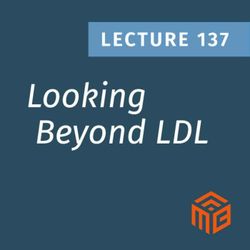
137. LDL Isn’t the Problem? The Real Drivers of Heart Disease
22:48||Ep. 137📢 Ask Dr. Bikman’s Digital Mind (multilingual):https://benbikman.com/ben-bikmans-digital-ai-mind📢 Dr. Bikman’s Community & Coaching Site: https://insuliniq.comTopic:LDL cholesterol is a weak predictor of heart disease compared to markers of insulin resistance, metabolic syndrome, and the triglyceride-to-HDL ratio. True cardiovascular risk is driven far more by metabolic dysfunction than by cholesterol numbers alone.Summary:In this episode, Ben challenges the long-standing belief that LDL cholesterol is the primary driver of heart disease. While LDL has dominated cardiovascular conversations for decades, large-scale data show that nearly half of people hospitalized with heart disease have “normal” LDL levels.Instead, the strongest predictors of cardiovascular risk — especially premature heart disease — are markers of metabolic dysfunction, particularly insulin resistance. Measures like the lipoprotein insulin resistance (LP-IR) score, type 2 diabetes status, metabolic syndrome, and even the simple triglyceride-to-HDL ratio dramatically outperform LDL cholesterol in predicting who will develop heart disease.One of the most practical tools discussed is the triglyceride-to-HDL ratio, which can be calculated from a standard lipid panel. This ratio reflects underlying insulin resistance and small, dense LDL particles far better than LDL levels alone.Dr. Bikman also reviews the modest benefits of statins in primary prevention and highlights a critical point: lowering LDL does not address the root metabolic dysfunction driving cardiovascular disease. In fact, statin use — particularly in women — may increase the risk of developing type 2 diabetes.The takeaway is clear: cardiovascular prevention should shift from being LDL-centric to metabolism-centric. Insulin sensitivity, triglycerides, HDL, fasting insulin, and glycemic control are far more powerful indicators of risk than LDL cholesterol alone.References:For complete show notes and references, we invite you to become an Insider subscriber. You’ll enjoy real-time, livestream Metabolic Classroom access which includes live Q&A with Ben after the lecture, unlimited access to Dr. Bikman’s Digital Mind, ad-free podcast episodes, show notes and references, and Ben’s Weekly Research Review Podcast. Learn more: https://www.benbikman.comNOTE: The information presented is not intended to be a substitute for professional medical advice, diagnosis, or treatment. Dr. Bikman is not a clinician—and, he is not your doctor. Always seek the advice of your own qualified health providers with questions you may have regarding medical conditions.Ben’s favorite yerba mate and fiber: https://ufeelgreat.com/usa/en/c/1BA884Exogenous ketones: A high-quality option is the NSF-certified goBHB from Clean Form Nutrition, where you can use the code BEN10 for a 10% discount: https://cleanformnutrition.com/products/go-bhbBen’s favorite meal-replacement shake: https://gethlth.com (discount: BEN10)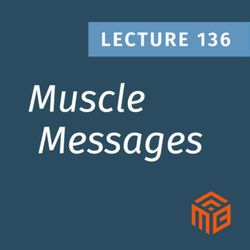
136. Why Exercise Benefits Every Organ — Not Just Muscle
25:47||Ep. 136📢 Ask Dr. Bikman’s Digital Mind (multilingual): https://benbikman.com/ben-bikmans-digital-ai-mind📢 Dr. Bikman’s Community & Coaching Site: https://insuliniq.comTopic:Exercise prompts your muscles to release extracellular vesicles — tiny molecular packages that deliver health-boosting instructions to your brain, liver, fat, and more. These signals improve metabolism, reduce inflammation, and may even help reverse insulin resistance and obesity-related damage.Summary:Dr. Ben Bikman explains how extracellular vesicles (ECVs) — tiny biological packages released by cells — are revolutionizing our understanding of how exercise improves metabolic health. These vesicles act like molecular mail, delivering proteins, lipids, and microRNAs from one tissue to another, with effects that include improved insulin sensitivity, enhanced fat burning, and reduced inflammation.When we exercise, our muscles and other tissues release more ECVs, which travel throughout the body delivering beneficial molecular signals to organs like the liver, brain, fat cells, and immune system. Different types of exercise (aerobic vs. resistance) and different intensities produce ECVs with distinct “cargo,” which helps explain the diverse benefits of various workout styles.In conditions like obesity and type 2 diabetes, however, the story shifts. Dysfunctional tissues release harmful ECVs that can spread metabolic disease. Fortunately, exercise helps reverse this, replacing harmful signals with beneficial ones. Even brief bouts of exercise can shift this internal “conversation” in a healthier direction.Ben closes by highlighting the future potential of ECV research: personalized exercise prescriptions, new biomarkers, and even therapeutic applications like “exercise in a bottle.” But until then, the takeaway is clear: exercise isn’t just about movement — it’s a system-wide signal for better health.References:For complete show notes and references, we invite you to become an Insider subscriber. You’ll enjoy real-time, livestream Metabolic Classroom access which includes live Q&A with Ben after the lecture, unlimited access to Dr. Bikman’s Digital Mind, ad-free podcast episodes, show notes and references, and Ben’s Weekly Research Review Podcast. Learn more: https://www.benbikman.comNOTE: The information presented is not intended to be a substitute for professional medical advice, diagnosis, or treatment. Dr. Bikman is not a clinician—and, he is not your doctor. Always seek the advice of your own qualified health providers with questions you may have regarding medical conditions.#MetabolicHealth #ExtracellularVesicles #ExerciseScience #InsulinResistance #MolecularHealth #DrBenBikman #MuscleHealth #CellCommunication #MetabolismMatters #FatBurning #BrownFat #microRNA #FitnessScience #HormoneHealth #HealthyLiving #BloodSugarBalance #ResistanceTraining #AerobicExercise #MetabolicTherapy #SystemicHealth Ben’s favorite yerba mate and fiber: https://ufeelgreat.com/usa/en/c/1BA884Exogenous ketones: A high-quality option is the NSF-certified goBHB from Clean Form Nutrition, where you can use the code BEN10 for a 10% discount: https://cleanformnutrition.com/products/go-bhbBen’s favorite meal-replacement shake: https://gethlth.com (discount: BEN10)Ben’s favorite health check-up for men: https://blokes.co/drben15 (discount: DRBEN15)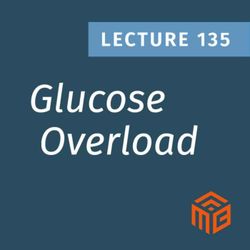
135. How Glucose Overload Breaks Your Metabolism (And How to Fix It)
27:37||Ep. 135📢 Ask Dr. Bikman’s Digital Mind (multilingual):https://benbikman.com/ben-bikmans-digital-ai-mind📢 Dr. Bikman’s Community & Coaching Site: https://insuliniq.comTopic:This episode explores how the NAD⁺/NADH ratio acts as a key metabolic switch, where excess NADH—often driven by high glucose intake—leads to insulin resistance and cellular dysfunction. Ben highlights how lifestyle changes, not supplements, offer the most effective way to restore balance and protect metabolic health.Summary:In this mini lecture, Dr. Bikman explains the critical role of the NAD⁺ to NADH ratio in cellular metabolism and its link to insulin resistance.NAD⁺ and NADH function like a cellular battery, cycling between charged and uncharged states to fuel energy production. However, when this balance tips toward excess NADH—as happens with chronic high glucose intake, aging, alcohol consumption, or inactivity—metabolic dysfunction follows.Ben walks through the mechanisms by which a low NAD⁺/NADH ratio disrupts insulin signaling, including suppression of mitochondrial function, accumulation of harmful lipid intermediates (like ceramides), and increased oxidative stress. He also introduces the concept of "reductive stress," a pseudo-hypoxic state that cells enter when overwhelmed by glucose, leading to long-term damage and perpetuation of insulin resistance.To improve this ratio and support better metabolic health, Dr. Bikman recommends five main lifestyle strategies: restricting refined carbohydrates, exercising regularly, practicing time-restricted eating, optimizing sleep, and reducing or eliminating alcohol.While NAD⁺-boosting supplements like nicotinamide riboside show promise in animal models, their human effects remain limited—highlighting that lifestyle changes still provide the most reliable path to metabolic improvement.References:For complete show notes and references, we invite you to become an Insider subscriber. You’ll enjoy real-time, livestream Metabolic Classroom access which includes live Q&A with Ben after the lecture, unlimited access to Dr. Bikman’s Digital Mind, ad-free podcast episodes, show notes and references, and Ben’s Weekly Research Review Podcast. Learn more: https://www.benbikman.comNOTE: The information presented is not intended to be a substitute for professional medical advice, diagnosis, or treatment. Dr. Bikman is not a clinician—and, he is not your doctor. Always seek the advice of your own qualified health providers with questions you may have regarding medical conditions.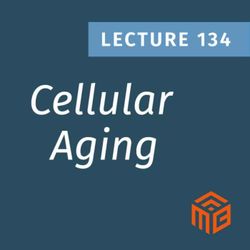
134. Why Your Cells Age (And What You Can Do About It)
23:17||Ep. 134📢 Ask Dr. Bikman’s Digital Mind (multilingual):https://benbikman.com/ben-bikmans-digital-ai-mind📢 Dr. Bikman’s Community & Coaching Site: https://insuliniq.comTopic:Ben explains how AMPK and mTOR are critical regulators of aging and metabolism, and how their balance can be influenced by diet and lifestyle. Instead of drugs like rapamycin, strategies like carbohydrate restriction and ketosis offer a safer path to optimizing longevity.Summary:In this Metabolic Classroom mini lecture, Dr. Bikman explores two of the most important molecular “switches” that regulate how cells age, grow, and repair themselves: AMPK and mTOR.These pathways operate in a delicate balance—AMPK promotes energy conservation, fat oxidation, and cellular cleanup (autophagy), while mTOR supports cellular growth and protein synthesis. When AMPK is up, mTOR is down, and vice versa.Ben explains how modern lifestyles—especially chronic overnutrition and excess carbohydrate intake—shift this balance toward persistent mTOR activation, which may accelerate aging and metabolic disease. He critiques the growing popularity of rapamycin for longevity, citing its lack of human data and serious side effects, particularly reproductive harm. Instead, he proposes that simple lifestyle strategies—like carbohydrate restriction, ketosis, and supplementation with ketones like BHB—can more safely optimize the AMPK/mTOR balance.He also highlights the importance of ketones as both energy sources and signaling molecules that can activate AMPK and stimulate autophagy. The lecture ends with a clear takeaway: longevity and metabolic health may not require pharmaceuticals, but rather informed choices around diet and lifestyle.References:For complete show notes and references, we invite you to become an Insider subscriber. You’ll enjoy real-time, livestream Metabolic Classroom access which includes live Q&A with Ben after the lecture, unlimited access to Dr. Bikman’s Digital Mind, ad-free podcast episodes, show notes and references, and Ben’s Weekly Research Review Podcast. Learn more: https://www.benbikman.comNOTE: The information presented is not intended to be a substitute for professional medical advice, diagnosis, or treatment. Dr. Bikman is not a clinician—and, he is not your doctor. Always seek the advice of your own qualified health providers with questions you may have regarding medical conditions.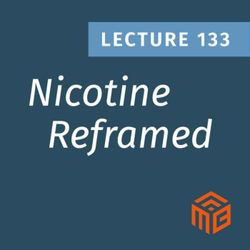
133. Separating Nicotine from Smoking: Myths, Metabolism, and Medicine
21:46||Ep. 133Listen ad-free by becoming an Insider: https://benbikman.comAsk Dr. Bikman’s Digital Mind (multilingual): https://benbikman.com/ben-bikmans-digital-ai-mindDr. Bikman’s Community & Coaching Site, Insulin IQ: https://insuliniq.comNicotine may not be the addictive villain it's made out to be. When separated from cigarette smoke, it shows surprising anti-inflammatory and neurological potential.Summary:In this Metabolic Classroom mini lecture, Dr. Ben Bikman revisits the molecule nicotine—not as an endorsement to use it, but to explore its distinct effects when separated from harmful compounds in cigarettes.Contrary to popular belief, nicotine alone is not highly addictive; tobacco additives like pyrazines likely amplify the addiction seen in cigarettes. Dr. Bikman details nicotine’s anti-inflammatory properties, particularly through activation of the alpha-7 nicotinic acetylcholine receptor, which may help conditions like ulcerative colitis, sepsis, and arthritis.Ben also explores its complex effects on metabolism—such as increased thermogenesis and fat oxidation—while warning of potential insulin resistance with sustained use.Lastly, he reviews fascinating clinical research suggesting therapeutic potential in conditions like ADHD, autism, Tourette’s syndrome, and even Alzheimer’s, all while emphasizing that nicotine, when separated from cigarette smoke, warrants more open scientific inquiry.References:For complete show notes and references, we invite you to become an Insider subscriber. You’ll enjoy real-time, livestream Metabolic Classroom access which includes live Q&A with Ben after the lecture, unlimited access to Dr. Bikman’s Digital Mind, ad-free podcast episodes, show notes and references, and online, live Office Hours access with Ben. It also includes Ben’s Weekly Research Review Podcast. Learn more: https://www.benbikman.comNOTE: The information presented is not intended to be a substitute for professional medical advice, diagnosis, or treatment. Dr. Bikman is not a clinician—and, he is not your doctor. Always seek the advice of your own qualified health providers with questions you may have regarding medical conditions.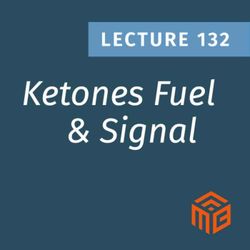
132. The Hidden Power of Ketones: Fueling + Signaling
27:57||Ep. 132Listen ad-free by becoming an Insider: https://www.benbikman.comReferences:For complete show notes and references, we invite you to become an Insider subscriber. You’ll enjoy real-time, livestream Metabolic Classroom access which includes live Q&A with Ben after the lecture, unlimited access to Dr. Bikman’s Digital Mind, ad-free podcast episodes, show notes and references, and online, live Office Hours access with Ben. It also includes Ben’s Weekly Research Review Podcast.📢 Ask Dr. Bikman’s Digital Mind (multilingual):https://benbikman.com/ben-bikmans-digital-ai-mind📢 Dr. Bikman’s Community & Coaching Site, Insulin IQ: https://insuliniq.comTopic Today:Ketones, particularly BHB, aren’t just backup fuel—they’re powerful signals that affect inflammation, gene expression, and mitochondrial function. This episode shows how BHB acts like a hormone to enhance metabolic health and cellular resilience.Summary:In this episode of the Metabolic Classroom, Dr. Bikman explores the remarkable role of beta-hydroxybutyrate (BHB), the most abundant ketone body, as both a metabolic fuel and a cellular signaling molecule. While traditionally seen as mere backup energy, BHB is now recognized as a potent agent that influences gene expression, reduces inflammation, and protects mitochondrial function.Ben unpacks the dual nature of BHB, describing how it activates specific receptors like GPR109A and FFAR3, modulates immune responses, and directly inhibits the NLRP3 inflammasome, a key player in chronic inflammation. He also highlights how BHB affects epigenetic regulation through HDAC inhibition, enhancing cellular resilience and antioxidant defenses.The lecture concludes by tying these pathways together to show how ketones—whether produced endogenously or taken as supplements—convey a coordinated biological signal of adaptation and protection. This shift in understanding elevates ketones from mere “backup fuel” to central players in metabolic health.NOTE: The information presented is not intended to be a substitute for professional medical advice, diagnosis, or treatment. Dr. Bikman is not a clinician—and, he is not your doctor. Always seek the advice of your own qualified health providers with questions you may have regarding medical conditions.Ben’s favorite yerba mate and fiber: https://ufeelgreat.com/usa/en/c/1BA884Exogenous ketones: A high-quality option is the NSF-certified goBHB from Clean Form Nutrition, where you can use the code BEN10 for a 10% discount: https://cleanformnutrition.com/products/go-bhbBen’s favorite meal-replacement shake: https://gethlth.com (discount: BEN10)Ben’s favorite health check-up for men: https://blokes.co/drben15 (discount: DRBEN15)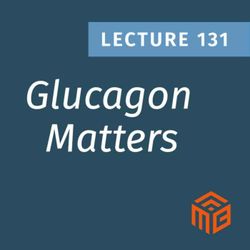
131. GLP-1 Isn’t Enough: Why Glucagon is the Key to Lasting Weight Loss
22:37||Ep. 131📢 Ask Dr. Bikman’s Digital Mind (multilingual): https://benbikman.com/ben-bikmans-digital-ai-mind📢 Dr. Bikman’s Community & Coaching Site, Insulin IQ: https://insuliniq.comIn this lecture, Dr. Ben Bikman explores the misunderstood role of glucagon, insulin’s often-overlooked metabolic counterpart.While insulin encourages fat storage and glucose uptake, glucagon signals the body to mobilize and burn stored energy. Contrary to popular belief, glucagon does not stimulate fat release from adipose tissue in humans. Instead, its fat-burning effects occur primarily in the liver, where it enhances fatty acid oxidation, ketone production, and energy expenditure.Glucagon’s power lies in shifting the metabolic balance through the insulin-to-glucagon ratio—a key determinant of whether the body stores or burns fat. Ben also unpacks the liver's molecular response to glucagon, including activation of mitochondrial fat-burning enzymes and ketone formation. Human studies now confirm that glucagon increases liver fat oxidation, making it a valuable target in new weight-loss drugs.New dual and triple agonist drugs that combine GLP-1 with glucagon receptors show superior weight loss outcomes compared to GLP-1 alone. They not only suppress appetite but also increase metabolic rate, making them potent tools in fighting obesity and fatty liver disease. However, lifestyle strategies like fasting and low-carb diets remain powerful ways to naturally leverage glucagon’s benefits without pharmaceutical intervention.Show Notes/References:For complete show notes and references, we invite you to become an Insider subscriber or member. You’ll enjoy real-time, livestream Metabolic Classroom access which includes live Q&A with Ben after the lecture, unlimited access to Dr. Bikman’s Digital Mind, ad-free podcast episodes, show notes and references, and online, live Office Hours access with Ben. It also includes Ben’s Weekly Research Review Podcast. Learn more: https://www.benbikman.comNOTE: The information presented is not intended to be a substitute for professional medical advice, diagnosis, or treatment. Dr. Bikman is not a clinician—and, he is not your doctor. Always seek the advice of your own qualified health providers with questions you may have regarding medical conditions.
130. Stop Metabolic Inflammation at the Source: Your Gut
34:57||Ep. 130📢 Become an Insider: https://benbikman.com📢 Ben’s LPS/Leaky Gut Recommendations: https://us.fullscript.com/plans/insuliniq-leaky-gut-recommendations📢 Ask Dr. Bikman’s Digital Mind (multilingual):https://benbikman.com/ben-bikmans-digital-ai-mind📢 Dr. Bikman’s Community & Coaching Site, Insulin IQ: https://insuliniq.comIn this Metabolic Classroom lecture, Ben explains how lipopolysaccharides (LPS)—toxic molecules from gram-negative gut bacteria—can escape into the bloodstream through a compromised intestinal lining, triggering chronic low-grade inflammation and insulin resistance.Dr. Bikman breaks down the roles of tight junction proteins like ZO-1, occludin, and claudins, and explains how the signaling molecule zonulin disrupts these junctions. Zonulin release is often triggered by dysbiosis and dietary components like gluten and fructose.He also highlights how LPS-induced inflammation impairs insulin signaling and promotes ceramide production, contributing to liver fat accumulation and systemic insulin resistance.Ben offers practical, evidence-based strategies to maintain gut barrier integrity and reduce LPS absorption—these include:- apple cider vinegar- spore-forming probiotics (especially Bacillus subtilis)- prebiotic fibers (like FOS and XOS)- and omega-3-rich foods or supplementsDr. Bikman ends with dietary and lifestyle takeaways to protect gut health and metabolic function.Show Notes/References:For complete show notes and references, we invite you to become an Insider subscriber or member. You’ll enjoy real-time, livestream Metabolic Classroom access which includes live Q&A with Ben after the lecture, unlimited access to Dr. Bikman’s Digital Mind, ad-free podcast episodes, show notes and references, and online, live Office Hours access with Ben. It also includes Ben’s Weekly Research Review Podcast. Learn more: https://www.benbikman.comNOTE: The information presented is not intended to be a substitute for professional medical advice, diagnosis, or treatment. Dr. Bikman is not a clinician—and, he is not your doctor. Always seek the advice of your own qualified health providers with questions you may have regarding medical conditions.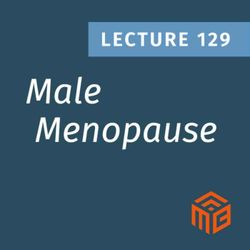
129. Boost Testosterone Naturally: Mitochondria, Insulin, and Fighting Back
24:38||Ep. 129📢 To listen ad-free, become an Insider: Ben’s website, https://www.benbikman.com📢 Dr. Bikman’s Community & Coaching Site, Insulin IQ: https://insuliniq.comIn this episode Dr. Bikman explores the concept of “male menopause,” more accurately termed andropause. While women experience a dramatic hormonal drop-off due to the depletion of ovarian follicles, men experience a gradual decline in testosterone, primarily because their testosterone-producing Leydig cells become less efficient with age. This slow reduction begins in the 30s or 40s, and free testosterone (the biologically active form) declines even faster than total testosterone due to increasing levels of sex hormone-binding globulin (SHBG).The lecture delves into the cellular mechanisms behind this decline, focusing on mitochondrial dysfunction and insulin resistance. Because testosterone synthesis starts with cholesterol being transported into the mitochondria, anything that impairs this transport—like declining STAR and TSPO proteins or mitochondrial fragmentation—can reduce testosterone production. Dr. Bikman emphasizes that insulin resistance plays a central role by impairing Leydig cell responsiveness and increasing ceramide production, which worsens mitochondrial fission and dysfunction.Body fat also plays a major role in hormonal health, as it increases aromatase activity, converting testosterone into estradiol. This creates a damaging feedback loop—more fat leads to more estrogen, which suppresses testosterone production, which then leads to more fat gain.Dr. Bikman outlines a set of interventions to break this cycle and support testosterone naturally, including:- Weight loss, especially reducing visceral fat- Resistance training, with caution to avoid overtraining- Cold exposure, done strategically (before, not after exercise)- Sleep hygiene and stress reduction- Limiting alcohol intake- And in some cases, Testosterone Replacement Therapy (TRT), with caveats about fertilityShow Notes/References:For complete show notes and references, we invite you to become an Insider subscriber or member. You’ll enjoy real-time, livestream Metabolic Classroom access which includes live Q&A with Ben after the lecture, unlimited access to Dr. Bikman’s Digital Mind, ad-free podcast episodes, show notes and references, and online, live Office Hours access with Ben. It also includes Ben’s Weekly Research Review Podcast. Learn more: https://www.benbikman.comAlso, Dr. Bikman’s Digital Mind can interact with you in many languages: https://benbikman.com/ben-bikmans-digital-ai-mindIMPORTANT NOTE: The information presented is not intended to be a substitute for professional medical advice, diagnosis, or treatment. Dr. Bikman is not a clinician—and, he is not your doctor. Always seek the advice of your own qualified health providers with questions you may have regarding medical conditions.Ben’s favorite yerba mate: https://ufeelgreat.com/usa/en/c/1BA884